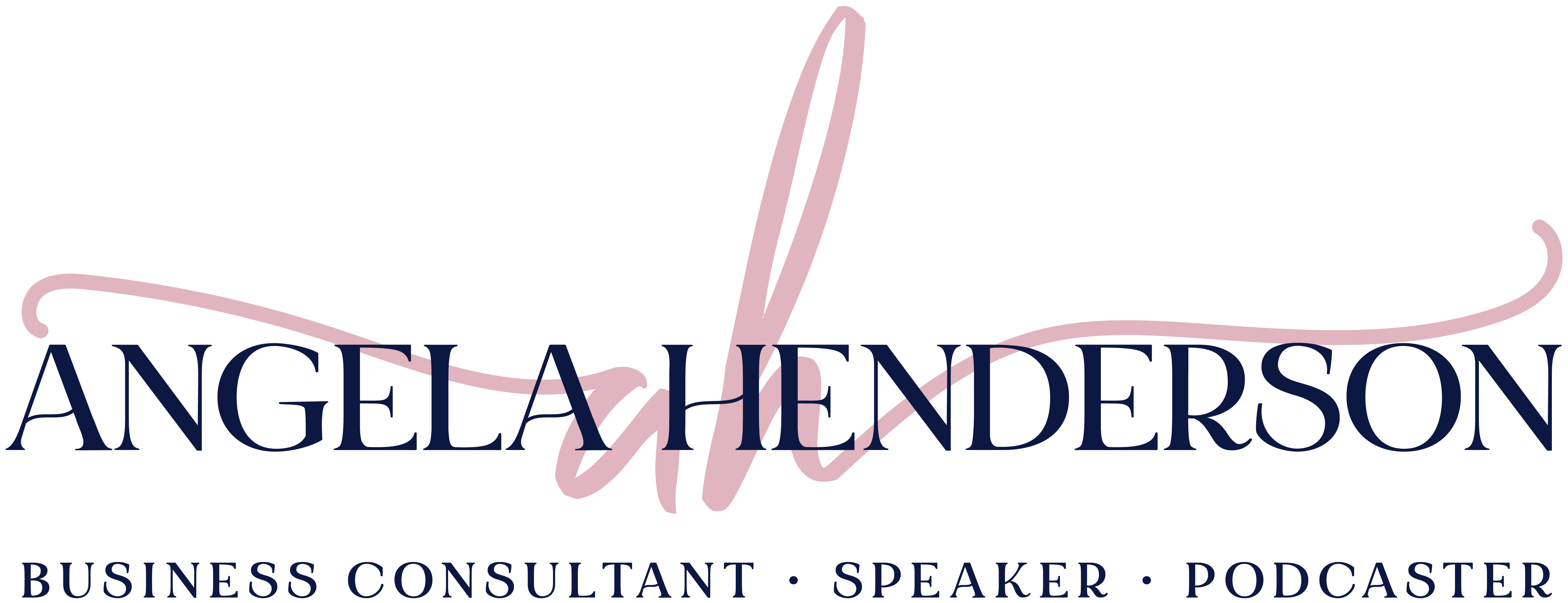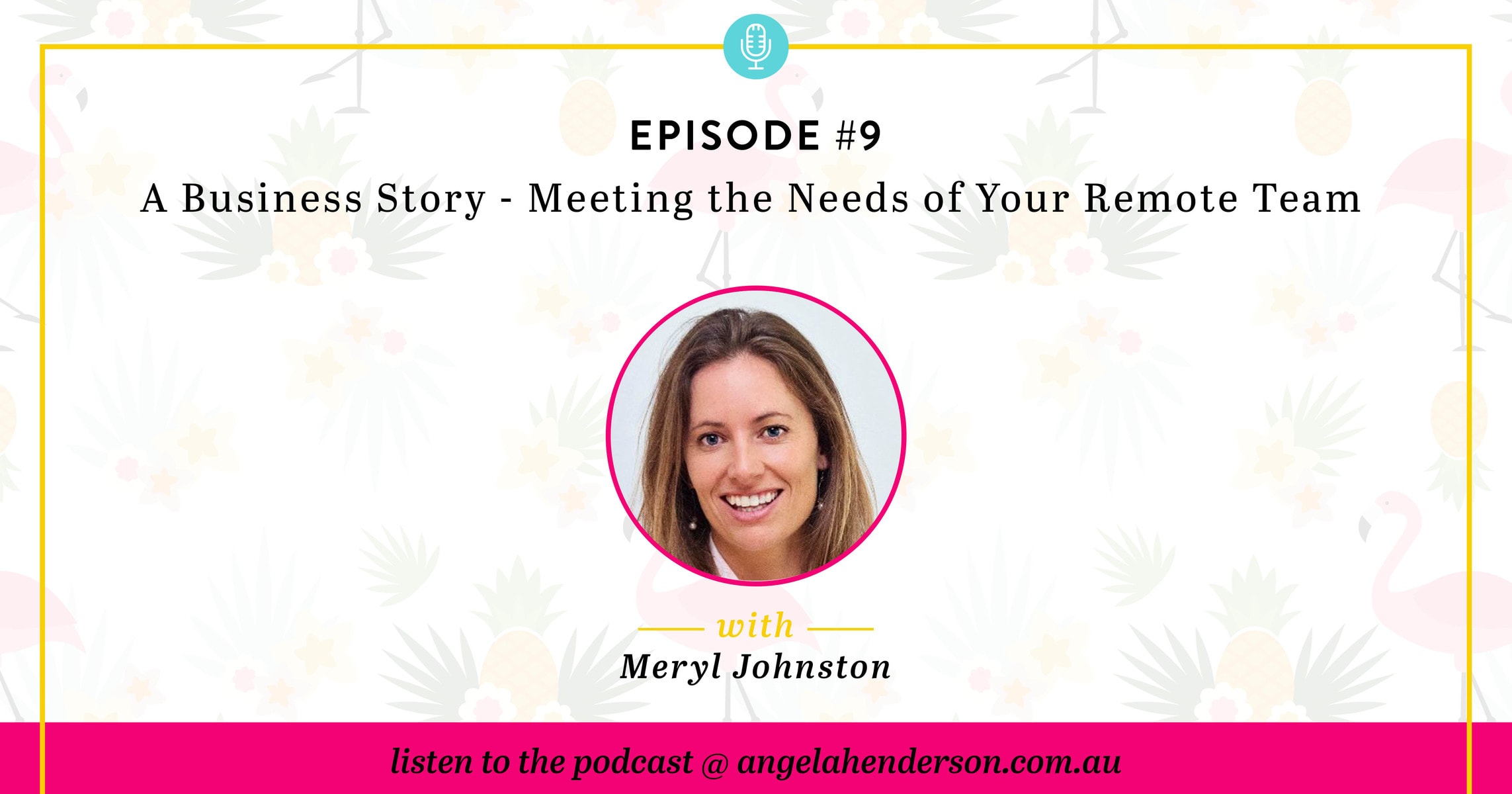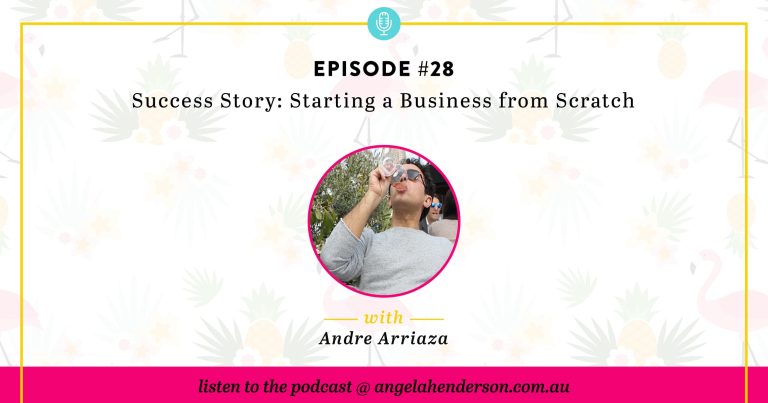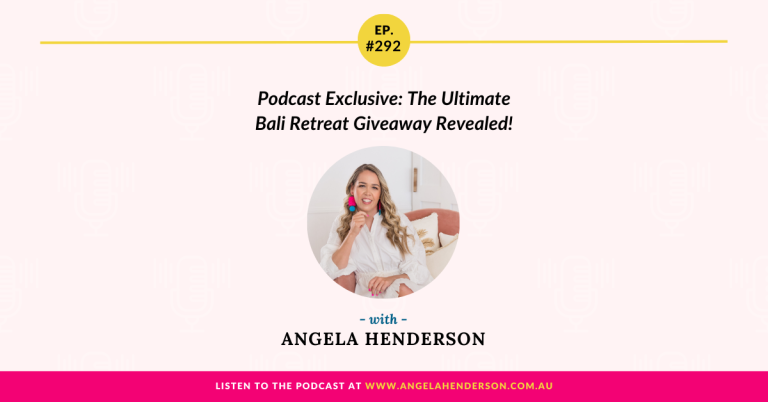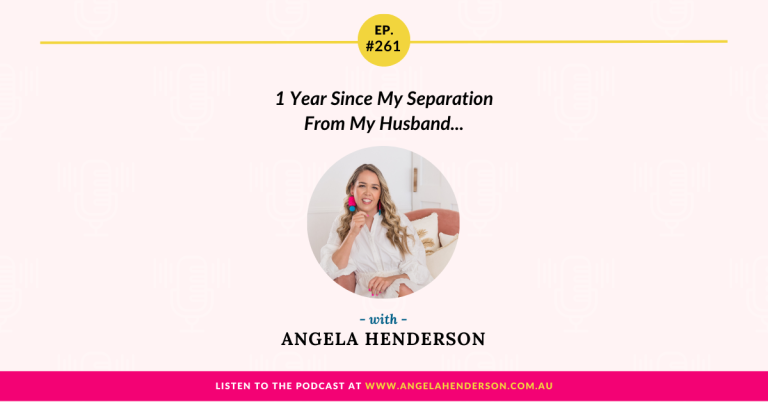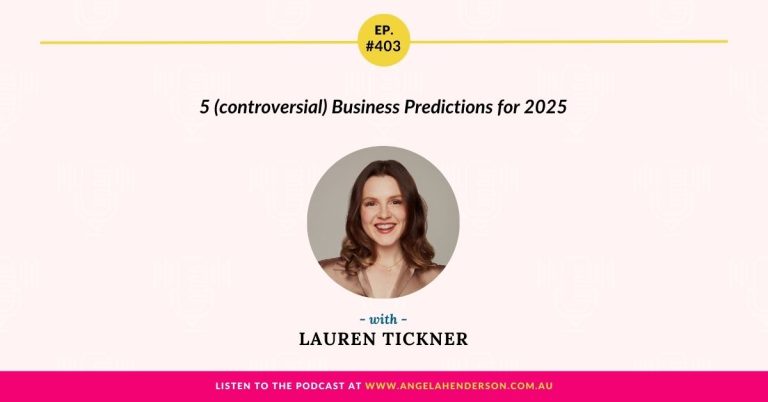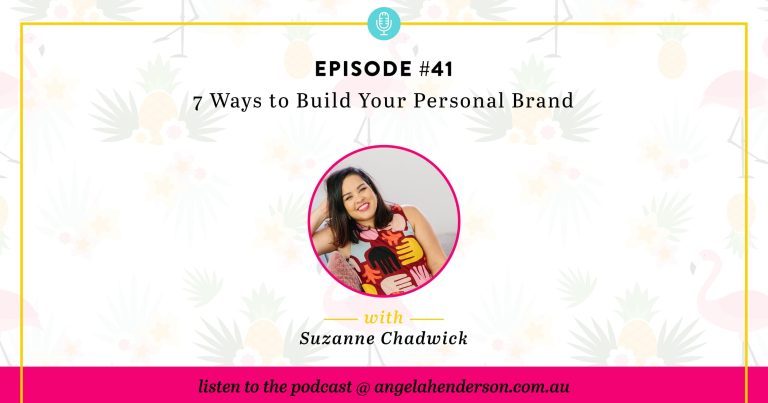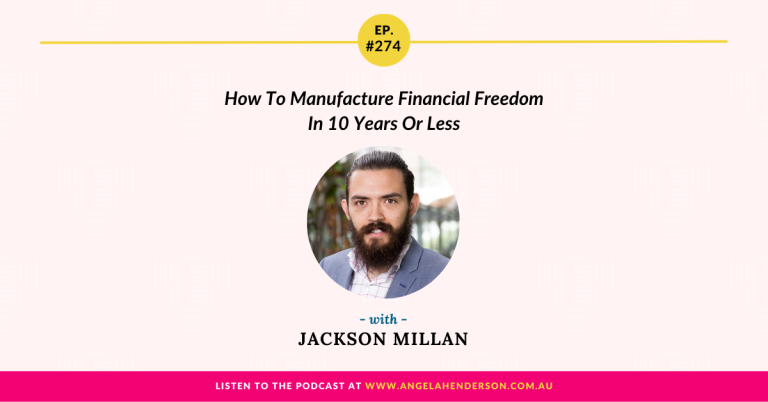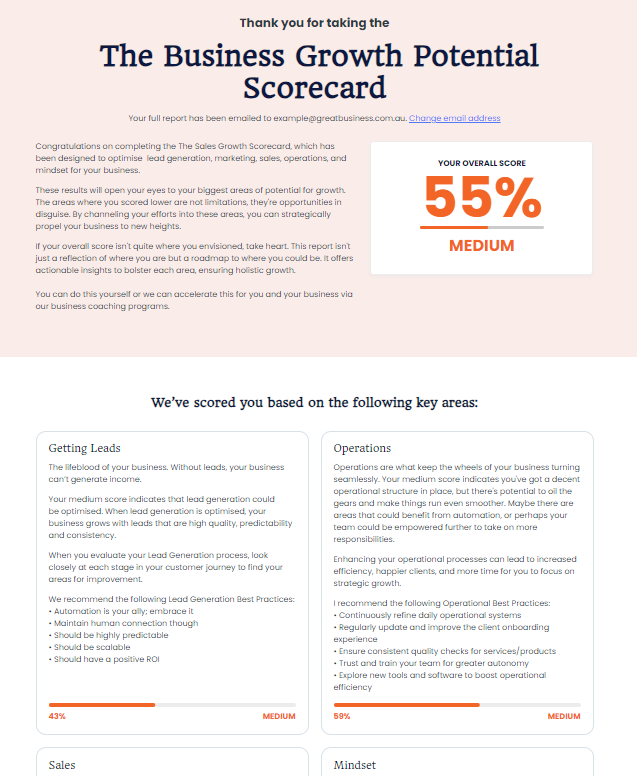In this episode, I am joined by Meryl Johnston, founder of Bean Ninjas. We will talk about her journey of growing her business, building relationship, networking and the systems they use. And most importantly, building her remote team based on values that enable parents to have a career and at the same time take care of their families.
Important Links Mentioned in the Show:
Bean Ninjas Facebook Business Page
Angela Henderson Active Business Facebook Group
Angela Henderson Facebook Business Page
Prefer to read Meeting the Needs of Your Remote Team? Here’s the transcript:
ANGELA:
You’re listening to the Business and Life Conversations podcast, with Angela Henderson, episode nine.
Hey there, you’re listening to the Business and Life Conversations podcast, my name is Angela Henderson, and on this show we talk about improving your business, life or both. By having amazing and rich conversations with brilliant guests. Who will inspire you and who will give you tips and tricks, to help you grow both in life and in business.
Hey, everyone. Welcome back to another amazing episode of the Business and Life Conversations Podcast with me, your host, Angela from Angela Henderson Consulting. Now, I’m really excited about today because I’ve got one pretty amazing person on the show, Meryl Johnston, who is the founder of Bean Ninjas. That’s right, Bean Ninjas. During today’s show, you’re going to hear about how Meryl has built a remote team of employees based on values which ultimately has enabled the working mothers and fathers the opportunity to have a great career, while at the same time having flexibility to look after their families and create long-lasting childhood memories.
Welcome to the show, Meryl.
MERYL:
Thanks a lot, Angela. It’s great to be here.
ANGELA:
Great to have you here. Now, listen, what’s the weather like? I’m obviously in Brisbane, so I’ve got sun shining away. You’re down on the Goldie. The weather playing nice for you, too, down there today?
MERYL:
It’s beautiful, and I’ve actually snuck out for a surf just before this podcast episode, and it was lovely out there.
ANGELA:
It was. So now listen, I’m not big in surfing, pretty much ’cause I’m from Canada. Your wildlife and everything else seems to continue to freak me out with brown snakes showing up on my doorstep, etcetera. So, tell me a little bit, what was the water like today? Was it still lovely, even though we’re here in the middle of winter?
MERYL:
Yeah, it was crystal clear, blue. It was beautiful.
ANGELA:
It was awesome. Tell me, have you ever encountered a shark? Be honest.
MERYL:
I’ve never seen one, but I have been asked by a lifeguard to quickly get out of the water when there was a shark sighting, but I’ve never seen it myself. Which I think is a good sign. Because apparently, you can’t see them if they’re about to attack you.
ANGELA:
Oh, that’s awesome. That’s also another reassuring fact as to why I only go to my ankles when I’m in the ocean. I’m like, “Oh, my God.” It freaks me out. And then I’m the crazy mum on the sidelines. I’m like, “Kids, look out! Look out!” And they’re just like, “Dude, who’s this tourist?” But I’m like, “I’m actually a local. I’m just kind of crazy.” At least the lifeguards were there. That’s a positive to usher you out in safety.
MERYL:
Yes, exactly.
ANGELA:
All right, dude. Well, again, I could probably talk about my fear of Australian wildlife for some time, but that’s not why the listeners are here today. We’re here to talk about your amazing business. And again, we’ve only recently come across each other through another platform called the Dynamic Circle, which, for those who don’t know, is a membership platform for entrepreneurs and business owners around the world to connect. They’ve got some amazing conferences, amazing local meetups. What’s been your involvement with the Dynamic Circle?
MERYL:
I’ve been part of it for about three years now, and I actually co-founded Bean Ninjas with someone that I met in a mastermind from Dynamic Circle, so it’s been instrumental in my business journey, and I’ve been very involved going to the conferences. We actually sponsored a couple of their conferences, and I hosted a Gold Coast meetup.
ANGELA:
Yeah, just recently.
MERYL:
Yeah. So, we ran a weekend event for about 30 entrepreneurs on the Gold Coast.
ANGELA:
That’s awesome. They really are, Dynamic Circle, taking that initiative to connect people really remotely, and we’re gonna talk about that, too, in a minute about how your team is remote to you. But again, you can be say in Thailand. You can go on the membership and say, “Who else is in Bangkok? Do you wanna catch up?” So, it also really helps with decrease in social isolation as an entrepreneur, but again, I’m a huge believer, and I talk about it all the time about the power of networking and through those wonderful platforms. I think that, unless you network, your business will probably always continue to grow but not maybe at the speed that you’d want it to grow.
MERYL:
I think that’s spot on. I believe that investing in your own network and putting time into relationships is what sets you up for long-term success. I think it does take time to actually build long-term relationships and valuable relationships and to build that trust with different people and to provide other people with value. And I know that that’s something I’ve been working on for about four years now, and some of that is going to in-person events, but also putting time into those relationships because you can go to an event and then not stay in touch with someone. So, thinking about how you can help them or how you can stay in touch and really working on those relationships. I think it’s such an important thing, and actually something that I’m educating my team about, too, and providing opportunities for them to go along to events and helping them or training them with how I built my network so that they can do the same.
ANGELA:
I love that, at no stage in that little paraphrase or whatever you wanna call it, Meryl, did you say how you were selling anything. It was all about what can you give value back to someone. What can you do to connect other people with each other? And that’s where I think people get it so wrong is people go, “Oh, I’m gonna connect with say, Meryl, and we’re gonna do this and I’m gonna ask her to do X, Y, and Z for me.” It’s like, no. No, you can’t do that. A relationship isn’t built on favours. A relationship is built on the fact that you actually liking the people for who they are. And like you said you’re doing stuff like, ’cause you wanna help them, you’re not doing it because there’s an alternative motive. Would you agree?
MERYL:
Yes, I think that’s spot on. I think if you turn up to a conference, and you’re splashing business cards around everywhere, and trying to talk about what you do, and what you sell, that’s not really the way to build long-term relationships. It’s more about asking questions and understanding what other people are about and just listening. And then people might be interested in your story as well, but I think it’s very easy to go in and not observe how things work or what is the relevant context. I think it’s actually a lot of us can spend more time listening and then have our say and say our piece too.
ANGELA:
You know absolutely, and I think you know from me again listening, I could do probably a whole other podcast on just the power of listening if you’re an entrepreneur. So yeah, it’s so important, but yet a tool that is under-utilised by probably say like at least 90% of us. We love to talk, you know we’re always filled with excitement, our ideas, but sometimes like just sitting quietly, I’ve got ADHD, I’ll tell you a side funny story.
I did this floating tank, you know like those float tanks you can sit in, right, I was in one. And I’m cracking up ’cause again it’s supposed to be relaxing you and slowing your thoughts down and I’m in there and I’m like oh, okay, if there’s that many drips in ten seconds, I wonder how many that would be in a minute? And I’m like, oh I can touch my toes, and so I got out of this float tank and Shenai was there and I was like, “Shenai, I don’t know if it’s good for ADHD people. Like it’s calmed me. But I just feel like a little kid in a candy store there.” Anyways, sidetracked again, ADHD, I can get side-tracked very easily. But yeah, no, it cracks me up.
All right, so now listeners again, thank you for listening along so far. But that is not our main conversation that Australian wildlife and float tanks today. I am here to talk with Meryl about the fact of how she’s grown her business dealing with remote staff. That she’s got a key focus and ethics around making sure that parents, especially obviously mums, but equally dads, have an opportunity to be with their family.
But I want to go back to, I guess, where you started Meryl, and from the research that I’ve obviously found, getting prepared for the podcasters, correct me if I’m wrong, technically you’re a chartered accountant who originally started your career in the audit division at BDO in Melbourne, which was then followed by a number of years in commercial roles and a stint as a lecturer in accounting and audit. I can only assume here, that when you decided to create Bean Ninjas, there is an element of corporate life that you potentially were looking at ditching in the future. Would I remotely be correct in this?
MERYL:
Spot on. 100%. I’d been working in the accounting industry for bit less than 10 years. And audit is notorious for being required to work long hours. I wanted to get away from that. I actually started a consulting business before Bean Ninjas, and that was my transition to ditch the corporate lifestyle and surf more, work less. But I realised it wasn’t a great business model for me starting out, in terms of scale. It was good initially, I was able to surf more, because I was earning a good hourly rate, but then when I tried to grow the business, it was more difficult, it was all project-based. It was a difficult business to scale. And that’s when I was talking with Ben, who was facing similar issues, and that’s when we decided, right, Bean Ninjas, bookkeeping something where we can have recurring revenue and consistent cashflow. And it’s still in our skillset around accounting, but let’s try something that is within our skillset in our industry, but a bit different.
ANGELA:
And that’s beautiful, ’cause it leads right into now. So technically, theoretically, you’re still a chartered accountant by trade, however in a non-corporate, suit and tie, heels, nine-to-five, you gotta live your life basically to what, you gotta beg to take holiday leave or your lunch hour, or you’re staying eight hours past your exit time for the day. So now tell me, obviously we’ve got the history down, but give me a little bit more about Bean Ninjas. How did it start? Why did you want to start it? What was your motivation behind that?
MERYL:
A part of it was about building something that was bigger than myself, and creating a business that was an asset. My consulting business, no one would ever buy it, it was just me selling my skills. I’ve always been interested in business, and I actually had a business when I was about 20, coaching tennis.
ANGELA:
Oh cool.
MERYL:
That was my first attempt, no really, it was fun, went for a couple of years. And I knew that that’s what I wanted to do. But I also knew I didn’t have the right skills at that time. And that’s why I studied, and then worked in accounting, to really build my business skills. To build a really strong foundation. So that’s something I’ve always known I wanted to run businesses, but it’s been quite a process building all of my skills to the point that I felt that I could do it.
And then with Bean Ninjas, it was about building that asset. Building a business that had systems and a team so that, well the ultimate goal that Ben and I were aiming towards was to build million-dollar business with the intention we could work less than 20 hours a week. And we still haven’t achieved that, and I actually bought Ben out of the business about 18 months in, so it’s just me now. My work hours are still not 20 hours a week, but that goal of always having lifestyle, that has always been a fundamental part of our business and the values that we have and that translates not just to me, but other people in the team. So, we attract other staff that wanna do great work in the accounting industry, but also wanna have balance in their life, and whether that’s with their family or we’ve got other surfers and other people with interests as well. And that’s really a core of what we’re about.
ANGELA:
So that’s kind of what you’re about, but tell us a little bit more about what is your service? What is Bean Ninjas? What are you offering to those?
MERYL:
Sure. What do we actually do? Our service is bookkeeping and financial reporting. So, when a business starts, often their focus is around selling to their customers and generating initial cashflow. And then, at a certain point in time, if you’re based in Australia, then you’ll need to register for GST, and if you’re in other countries around the world, you’ll probably gonna have to start paying taxes. And it’s at that point, that many business owners realise they’ve not kept very good records. And that’s where we come in.
Usually bookkeeping’s not the first thing that you think of when starting a business. But it’s definitely something that’s very important quite early on in setting up a business. So that you’ve got accurate records to pay taxes, but also so you know how much profit you’re making. And that’s what we specialise in. Accurate records for tax compliance, and then also really good reporting to give business insights.
ANGELA:
I think again, as a business consultant, I’m all about creating foundations. Because if you can’t have your foundations, it’s always quite hard to scale. And I believe bookkeeping and accounting are fundamental for business growth. Because so often I see people going, “Oh yeah, I made X amount.” But I’m like, “Hold on. Did you account for your overheads? Did you do this?” And they’re like, “Oh. No.” So I’m like, “Well, actually, you don’t have a handle on it.” So, I think they’re kind of, “Oh, I’m making a lot.” But when they actually put pen to paper and actually break down their expenses, oh maybe I didn’t actually need a third laptop for whatever reason. It’s just you and the business.
I’m probably the few and far between, when I first started my first business, Finlee and Me, I actually was told just in a random group to register for GST right from the beginning and just to get into the habit of doing the BAS statements, doing them every quarter and things like that. So, listen obviously, I’m not an accountant, so always speak to your accountant before taking any advice, but for me, it was really good. So, I’ve always been able to look at where we’re at and what we’re doing. As the bigger you get, trying to keep receipts in order and all of that was crazy, so I just started with now I’m on Xero, and I love Xero and it’s amazing and it’s so simple and it links with your bank accounts and things like that so I’m all about going back to the foundations and bookkeeping, do it people. Listen to Meryl and me. You need to do it.
MERYL:
That’s spot on about getting it right from the beginning. Because if you’ve got hundreds and hundreds of transactions as you grow, you get to that point, then it’s really hard to go back and change your processes. And you’re right. Getting set up on something like Xero, that’s the software we specialise in. We actually only work with Xero, and things like having a method for capturing receipts. It’s really easy once you’ve got good habits. But it’s just about creating those habits at the beginning, rather than when you’re a year or two into the business, and then it can feel overwhelming. And if someone asks you how much profit you’re making or how much, you wanna be able to work out how much to pay yourself. And there’s a number of other things, like whether you can hire someone. And if you don’t have good records, how are you going to do that?
ANGELA:
Exactly right. Or if you wanna take out a business loan, you gotta be able to substantiate to the bank what it is. And I’m working with a couple clients at the moment, and it’s one of my key questions I ask in my initial interviews. What’s your revenue, what’s your profit margin, what’s going on here? And a couple clients were like, “Oh, I haven’t done taxes for a couple of years.” I was like, “Say what?” And I was like, “No, so it’s literally top priority.” One of them has just sent them through and I kept saying to her when you actually do it, you’re gonna be like a weight has lifted. Because it’s partly holding you down. The other one’s about to finish, but my first one, she’s like, “Oh my gosh. Thank you so much for giving me that kick up the butt.” Because it was, it was just weighing her down, and now we’ve got a system in place with her own bookkeeper and it’s better. Yeah, so anyways, I think it’s so important ’cause you just get further and further behind.
MERYL:
Yeah, that’s great advice. Even if it’s not a big job to catch it up, you’re right, it is that weight on your shoulders. That feeling of concern about not knowing whether you’ve got a big tax bill or if you’re gonna be chased by the tax department.
ANGELA:
So, I wanna know a little bit more about Bean Ninjas. So obviously, you’ve given me a little bit of the background information in what you guys do. But did you and Ben initially set it up with the core ethics that you have now around really accommodating for mums and dads to be able to live that balance, that lifestyle? Or did that come later on down the track?
MERYL:
It did happen over time. It wasn’t something that we were explicit about in the beginning, but I think that was partly because we were new business owners and we didn’t know that it was important to define our mission and our vision and values and communicate that with the team. But we were living out those values even though we hadn’t actually written them down anywhere.
So, Ben had a two-year-old daughter, and he would finish in the early afternoon, so he could spend time with her every day. And so that was built into the way that we were working together. We definitely weren’t working nine-to-five or nine-to-seven like a startup or a traditional business or a traditional accounting firm would. So, we did have those flexible hours. And the same, I was working quite long hours in the beginning stages, but it was still flexible. So, I was still taking time out in the middle of the day to surf, even though I was working late at night sometimes or on the weekend. So, we knew that those values were important to us, and then as our team grew, we started to attract other people who either had children or who had other interests and really wanted that flexibility. And so, as these people came on board, we decided that we wouldn’t have set working hours, we wouldn’t have a set location that anyone needed to work, and that really provided that flexible environment for anyone in the team.
ANGELA:
And would you also say that with your level of flexibility then, from what I understand, you’re not only just based in Australia, you’ve got different sections across the world, correct? Meeting the needs of not just Australians, but many other countries.
MERYL:
Yeah, that’s right. So, we actually have team members based in the U.S. and also in Europe. And the same kind of thing. So, they all have flexible hours and they usually serve clients in the country that they are based in. But we do have some crossover around that too. And again, we didn’t actually start Bean Ninjas with the intention of serving clients in different countries. But it was actually through Dynamic Circle that we started to get referrals as well. I think we had about five referrals and then we realised, well, there’s an opportunity here. That’s enough clients to justify hiring someone in the U.S. So, let’s just test it. We hired a CPA in the U.S. and that was our first foray into international business.
ANGELA:
Which is cool, because if we go back to what you initially said at the beginning is that when you were doing the tennis gig when you first started or when you were doing your own consulting, you knew that you weren’t gonna be able to scale. So again, you talked about being able to have a million-dollar business to be able to work 20 hours a week. So, I can only assume that by being flexible, meeting the needs of mums and dads but also those who don’t have kids obviously, and then growing into other countries, again the scalability is much greater than if you’d just remained in Australia. Would that be true?
MERYL:
It’s much greater. And I think from a risk point of view, it’s good to be in different currencies, operating in different environments and being spread out, so that if there’s a particular region that has an economic downturn, or if there’s a particular market segment or type of client, that’s something we’re aware of, both from a region point of view, but also we try not to be reliant on one big client but have a big spread of many, many clients. We’re interested in growth, but we’re also interested in managing our risks around different things, like economic downturns or foreign currency fluctuations. That’s the accountant in me talking.
ANGELA:
Yep.
MERYL:
But also, from a scalability point of view, there’s so much more opportunity where you can actually operate and grow. Especially somewhere like the U.S., it’s so much bigger than Australia. So, we’ve built systems that can be replicated in other countries and hopefully grow and really take off in other countries too.
ANGELA:
I think it is a touchpoint to talk about, that so many businesses, especially when they’re first starting out, is you’ve got all your eggs in one basket. So, they might only have one stream or they’re only able to monetize their business in one way. However, I’m always looking at, when I work with my clients, on how can we bring in multiple revenue streams. So, for you, I guess, is your revenue streams are each different country, a separate revenue stream per se that collectively comes together to make your business.
But some of these times, if Facebook for example how they market themselves, if they’re dependent on Facebook the entire time, Facebook crashes tomorrow, well then, their business is tits-up, for lack of a better word.
So, I really like the approach that you’re taking from a risk point of view, and that you’ve really thought about that. Again, the economy, if the U.S. go into recession again, but you still have enough clients in other parts of the world, your business isn’t gonna go bankrupt. So no, I really like that strategy.
You talked about systems a minute ago, and how you’ve created particular systems that you could replicate, or duplicate in other particular countries. Can you walk me through, in your mind, as a chartered accountant, business owner, wanting to have that balance of freedom, your top five systems you have in place in order to ensure your business works smoothly, especially with so many different time zones and no set office hours?
MERYL:
So, when we started the business, we knew that we wanted it to run in everything in the cloud. So that we could, from the beginning, have team members based anywhere. And everyone logging into secure systems.
The first piece of software we signed up for was Google Apps for Work, so that we had a central location to store all of our files and to do things like client notes. We use Google Sheets quite a lot for calculations, so we had a central and secure location for that.
We also set up Slack, which is a team chat tool, and that way, it’s a good form of communication and it’s a lot faster and more efficient than email. So, we didn’t set up email accounts for team members, apart from them to log into different systems. And all communication for the team goes through Slack.
We use Help Scout which is a help desk system, and we have one central email address for clients. And then everything goes into Help Scout, so that we have oversight of all of the communication that’s happening from our team out to clients and that means that managers can jump in and out and everyone’s clear and it’s transparent about all the communication that we’re having with everyone.
We use Zoom for video calls and Slack is a chat app. But we also like to use video as frequently as we can. I think that really is important in building team relationships, where you can actually see someone rather than just chatting or even audio. And so, we try and do that as much as we can. Because it is hard to build team culture when you’re not in the same office. So that’s something we do there.
And then I have to say, Xero. How could I not say Xero?
Angela:
How could you not give a Xero punch?
MERYL:
And that’s something that we use internally for our own business, and then obviously that’s something that we support all of our clients with as well.
ANGELA:
You know, and again, maybe for listeners who’re going, “Oh, that might sound very sinful, what Meryl’s done.” Because I think in the world we live in, especially with the entrepreneur space, is that I think that there’s so much noise happening, people I think often over complicate things than what they actually need to. So, by just going back down to the basics or back down to the foundations, you’ve created a very successful business with multiple time zones etcetera by really again systemizing and using simple tools that also are very cost-effective. I too use Google Apps, again I don’t use Slack, but again very cost-effective. Zoom, again very cost-effective. And even though Xero is a paid service, still super cost-effective for what you’re getting in the long run.
MERYL:
Yep, absolutely. Most of the tools we were using when we first started, we were able to get the free version. And it was only, as our revenue grew, that we even started paying for some of these tools. We’ve only just recently paid for the paid Slack version. So, it’s amazing what you can do when you’re first starting out.
ANGELA:
Yep. But yet, the mindset of so many people is that they’ve gotta go pay for everything. But I’m like, actually, the tools are at your fingertips. You just have to give yourself permission not to get caught up in the swoop that everyone else is.
MERYL:
Yeah. I think it helps with business growth if you can be really disciplined about your spending. And again, this is the accountant talking. But if you can really be careful with what you spend, because the more you spend, the more you have to work just to pay that back. And you really wanna focus on the right things, spending your time on the right things, not just we’re working to pay for costs that you might not even need.
ANGELA:
I think the more you make, the more you spend. I think it does go hand-in-hand, but I think again it goes back to if you’ve got good bookkeeping, good accounting, you can actually see what’s going in and going out, and make adjustments on a regular basis.
I remember I was at a conference last year down in Sydney, and one of the gentlemen there talked about how him and his wife, I should know his name but I can’t remember, they were school teachers. He’s like, “There’s gotta be more to life than both of us working all these hours making very minimal.” And so, he actually went into his own business. And he sat with his accountant at the end of the year, and the accountant said, “Well, listen.” Wish I could know his name. “You’ve made $300,000 this year, but you’re actually worse off than you were when you were a teacher.” And he’s like, “Well, what do you mean? How can that be? I’m making five times the amount that I was as a teacher.” “But you’re spending actually more than what you’re making.” So, him and his wife, the following year basically said it was a no-spend zone. Everything had to be approved by each other. And the amount of money they actually saved, it was exactly the reason why they wanted to go into business, but the mindset was, “Well, now I make more, I can spend more.”
So again, goes back to good bookkeeping, good accounting, and just staying on top of that.
MERYL:
Yeah, spot on.
Angela:
Now regardless of these systems, let’s be honest, systems are only gonna go so far. What’s the one struggle you have though, still maintaining a team remotely? There’s gotta be something.
MERYL:
Oh yeah, absolutely. I think it’s team culture is a lot more difficult to build with a remote team than when you all have a chat with someone about their weekend or when you’re leaving work, you walk out to your car together. It’s much harder to recreate that environment remotely. And that’s something that we really have to work hard at, creating those opportunities for team members just to have chit-chat about their weekend and build those relationships. And also, we do try and meet in person, which is a significant cost for a small business, actually fly people around internationally, but we do prioritise that. Because I think it is so important.
ANGELA:
But even though the cost of having to fly people internationally, it ultimately would still save you an enormous amount of money from a retention point of view. You’re not having to then put time into recruitment. You still have to recruit because you’re growing it all the time, but recruitment because people are coming in going ’cause they’re unhappy etcetera. So, I still think overall, would you agree that you’re still saving money in the long run because of the retention, really valuing your team members?
MERYL:
Definitely. So, the flexible work hours and the good workplace that we’ve created, that attracts the right people to come and work for us. So, people that align with our values and that are really motivated and very experienced and smart. And we’re able to attract those people and then we can understand what they want out of life, and we try and provide that. So, we do have very good staff retention. I think that we’ve got career plans and opportunities, because we’re growing quickly, there’s a lot of opportunity for staff as well to keep being challenged and move up. So, I do think, yes, there is things like the international flights and some of the challenges with a remote team, but I think it’s definitely worth it to have the right motivated people in the team long-term.
ANGELA:
If you don’t have motivation, things start to stale very quickly. Then everyone else’s vibes, regardless if you’re remote or not, I still think people can pick up on people’s energies, especially if you’re using a platform like Zoom like where we are today, and we’re seeing each other. If people’s body language, like, “wah wah, this sucks”, or “I’m not interested in what you’re saying Meryl.” You’re gonna pick up on that. Other people are gonna pick up on it. And it’s gonna be a knock-on effect. So, well done for creating such a good culture. Nothing’s ever perfect, but I just like that you’ve really taken into the human element of what people need. Versus again having that corporate hat, which again I’ve been in the corporate world too, where you’re just like, “They don’t really care.” At the end of the day, you’re just a number. And you’re not doing that. So that’s very cool.
Now, in the short, correct me if I’m wrong, three-and-a-half years that you’ve had Bean Ninjas, you have extended to 11 members? Is that right, right now?
MERYL:
We’ve actually just hired our twelfth, yes.
ANGELA:
Well done, very cool. So, 12 team members in a very short span of time. For those who are wanting to expand their teams, what piece of advice would you give them in growing their team?
MERYL:
I think your first few hires are very important. And being really clear about what you’re hiring for and what skills and how they’re gonna help you. And for us, our first hires were bookkeepers, and that was the right, if I reflect back, was that the right first, second and third hire for us? And it was, because we were hiring people that could take over operations, so that Ben and I could focus on growing the business.
ANGELA:
Yep.
MERYL:
And that was really important, and related to that, we actually made a mistake with outsourcing in the very beginning. And then we realised, we needed to hire skilled people. Our first few hires, we made a mistake, but then we fixed it and we hired people, two people with 20 years of bookkeeping experience. And they were able to actually create systems and help set everything up.
And so, my piece of advice around that, is I would hire someone to help with operations, especially if you’re a service business, so service delivery, and get someone as highly skilled as you can, so that they can free you up as much as possible, and they can actually create systems and train other people. You might have to take a hit and not pay yourself as much to afford someone like that. So, get your personal finances in order and save up for it, and then get someone as good as you can afford.
ANGELA:
Yep. And I do see that often, listen, I’ve got two VAs in the Philippines, and two VAs in Australia. But they also have very different skillsets. And I think, sometimes, problems when I see people trying to grow or outsource, is they expect someone to do everything in one hit. But that’s not the way, the world doesn’t work like that. Like a specific heart surgeon doesn’t also have skills in how to repair kidneys. He might know the basics, but it’s not his specialty. So, I do think that when you’re outsourcing, like you said, quality people, screen them accordingly, but again, like you said, you might have to take a bit of a hit because you’re paying for quality.
MERYL:
Yep.
ANGELA:
Now, is there something I haven’t asked you, because as I’ve said, I love your story. I love your enthusiasm. I love what you stand for. I love from a mum who also has left corporate world because they don’t really care about people. Am I missing anything? So that the audience can hear a little bit more about your wonderful story. ‘Cause again, this today was more about a feature story. So, am I missing any key element that would really be important for the listeners?
MERYL:
I suppose there’s lots of different topics we could discuss that relate to the Bean Ninjas story, but I think the theme for today was around building remote teams and hiring. And building a team based on values. And being able to support working parents. And I think that we’ve covered that. I mean, there are interesting elements of the Bean Ninjas’ story, around things like buying out my business partner and how we figured out all of that, and then Mick taking on investment, but I think that’s probably not, that’s a whole other topic.
ANGELA:
I’ll have you back on for episode number 200 and 300. Perfect. Sounds great.
MERYL:
But I think in terms of hiring and building teams, I think we’ve covered everything that I wanted to discuss related to that.
ANGELA:
And I think again, like you said, we’ve talked about the five different key systems that you’ve talked about, so Google Apps, Slack, Help Scout, Zoom, Xero. You’ve also talked about really the importance of making sure you’ve got core values that you’re following, that you bring on the right type of members, and that when you do, that you’re probably looking at quality versus quantity. So again, making sure that you’re looking at your finances.
And obviously in preparation for the show today, I may have stopped you, as I do the majority of my guests that are coming on board. When I went to the website which is www.beanninjas.com, I really loved the wonderful wealth of blog articles you had, because it wasn’t just focused on bookkeeping, it was focused on business collectively. So, if you are a listener, obviously you can head to www.beanninjas.com. But for those who want to know more about your services, or your social media platforms, etcetera, can you tell us a little bit about where they might be able to find you?
MERYL:
So, our blog is one of the best resources. That’s where we put a lot of time into that with weekly content. Could also connect with me on LinkedIn, which is Meryl Johnston, and I can give you the link for that, or also me on Twitter and that’s the same.
ANGELA:
No, perfect. Again, for those who are out there probably shaking their head going, “Yep, bookkeeping. Not really sure what it entails. Accounting, don’t really know what it entails.” I would encourage you to get a hold of Meryl and her team, so you have an opportunity to at least start planting the seed. You might not use her services right away, but it’s something that even if you just read some articles and start getting your head around bookkeeping and accounting and how it impacts your business positively and or negatively, I think it’s always a great start.
Now, before I either begin my podcast or when I end my podcast, I always like to ask the question, because I think it’s important we don’t just know Meryl, who is a Bean Ninjas awesomeness levelless woman ever, but for me, you’re also a surfer, you like to surf a little. But if I had to ask you, what is the one mantra that you’re currently living by right now, what would that be?
MERYL:
Oh, putting me on the spot. That’s a hard one. So, I have a lot, there’s lots of quotes that I love. And I read a lot of business books. And I can’t think of the specific phrase, but it’s something around perfectionism. I can’t think of exactly how the wording of it, but it’s basically about getting things done and executing and finishing things rather than getting slowed down by perfectionism. So, I haven’t said that very eloquently, but I think it’s really important when you’re running a small business to ship things and get things out to customers and learn from that. So, don’t let perfectionism get in the way of that.
ANGELA:
Yep. Because I think again, sometimes you want it so perfect that you don’t take action, do you, whatsoever? And Dan Norris, someone who we both know, he talks about failing fast. Fail fast, get on with it and see if obviously you’ve taken the action, you’ve either succeeded or failed. But if you do fail, move on very quickly and onto the next thing. But don’t, like you said, kind of sit in that level of, “Oh, it didn’t work.” Or, “Oh, it’s not perfect.” Just rock and roll man. Just crank it out.
MERYL:
Yeah, exactly.
ANGELA:
Yeah, I couldn’t agree more. At the moment, I’ve got the podcast which has just launched. I’ve got the retreat, that’s just launched. My signature product’s coming out. Sometimes there are a lot of balls in the air. But it’s streamlined chaos, to say the least. But I’ve got a team around me. And the other thing that I think is, if I don’t do it, then how will I ever know if it’s gonna work or not? So, if any of those three streams at the moment fail, I’ll fail fast. Move on. But again, I’d rather take, I guess, imperfect action, than not take anything at all.
MERYL:
You’ve said that well. Imperfect action. That was it.
ANGELA:
That was it. See, now I’m a quote master. Just kidding.
Now, for those of you listening, my team and I will also be putting together the whole transcription for this episode at www.angelahenderson.com.au. And of course, I cover all sorts of related business and life topics inside my Facebook business group, the Australian Business Collaborative. So, make sure you head to Facebook and join that. I’d love to see you in there.
Now Meryl, it has been a delight. It’s a delight to have you here. To know that we’re gonna have to catch up for coffee very shortly. Think I’ve mentioned that to you. I’m heading down to, is it, oh, I’m horrible with names. Digital Downunder? I think? Is that the one in August that’s gonna be at the Gold Coast? So I’ll be down at the Gold Coast ..
MERYL:
Yeah, I think so.
ANGELA:
… in August for a couple days, so I’d love to catch up with you then.
MERYL:
Yeah, absolutely. You’ll have to come and check out the Bean Ninjas’ office.
ANGELA:
Oh dude, I’d love to. All right everyone, have an awesome day no matter where you are in the world. And I’ll look forward to catching you on my next episode of Business and Life Conversations with Angela Henderson. Bye everyone.
Thanks for listening to the Business and Life Conversations podcast with Angela Henderson, Meeting the Needs of Your Remote Team. www.angelahenderson.com.au.
